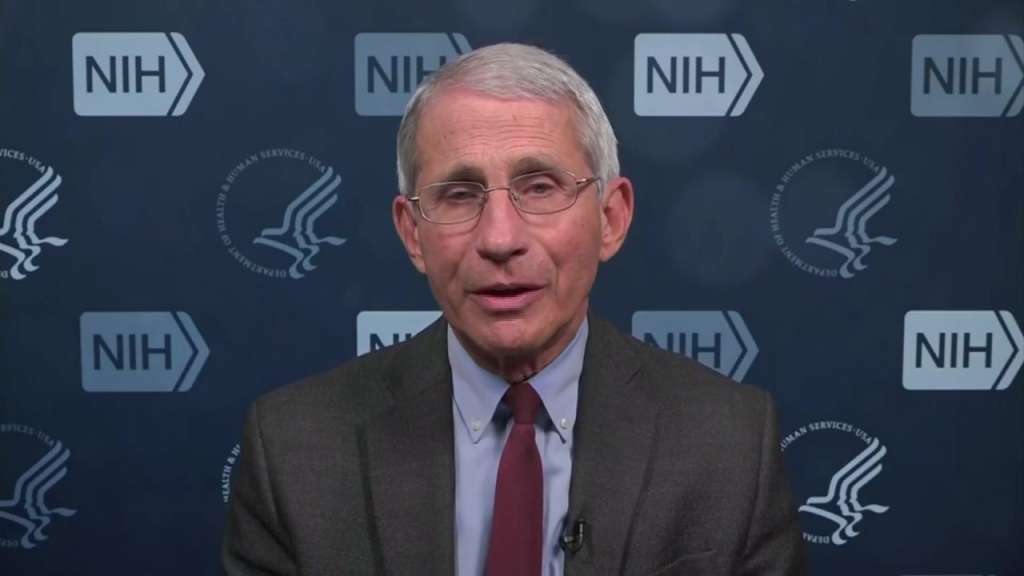Dr. Anthony Fauci, the nation’s top infectious disease expert, said Connecticut is currently “in a good place” because the state’s baseline rate of COVID-19 infections is very low, predicting the state will have an upper hand if flare-ups develop this fall.
“It is not inevitable that your numbers will go up” if the state continues to follow the fundamental principles of preventing the spread of infection, said Fauci, the director of the National Institute of Allergy and Infectious Diseases. He was referring to things like social distancing measures, mask wearing, contact tracing and making testing readily available.
“It is possible that you can use the favorable position that you are in now to keep the numbers down,” he said. “I urge you to utilize the advantageous position that you’re in, in Connecticut, with a very low baseline to try and keep it there.”
Monday marked the first time Fauci has participated in Democratic Gov. Ned Lamont’s coronavirus briefing with reporters. Lamont has invited other medical experts, including former Food and Drug Administration Director Scott Gottlieb, to make presentations and answer questions from reporters.
Lamont referred to Fauci as the “most credible voice coming out of Washington, D.C., the voice I listen to, the voice that’s going to give us some confidence that what we’re doing, we’re doing appropriately and we know that we can change course if we have to.”
Lamont’s comments come as members of the state’s largest teachers unions have voiced concerns about returning to the classroom, given the continuing pandemic.
During an earlier video conference appearance, Fauci told physicians and medical students at New Hampshire’s Dartmouth-Hitchcock Medical Center, that while the nation’s “default principle” should be having children return to school, he warned that may not apply to those states with high infection rates.
“There may be some areas where the level of virus is so high that it would not be prudent to bring the children back to school,” he said. “So you can’t make one statement about bringing children back to school in this country, it depends on where you are.”
In other coronavirus news:
___
CONNECTICUT’S ECONOMY
While Connecticut’s economy is beginning to improve, state Comptroller Kevin Lembo warned Monday the state needs more financial help from the federal government to address the impacts of the coronavirus pandemic, including the extension of the $600 a week supplemental unemployment benefit.
He noted how the bond rating agency Moody’s Analytics recently cited Connecticut as one of the few states with enough reserves to handle a modest recession, with a current balance of more than $2.8 billion, but warned that significant federal help was needed to prevent more serious scenarios.
“It’s decision time,” the Democrat said in a written statement. “Our state economy is showing signs of recovery from the devastating effects of the COVID-19 pandemic, but without a significant investment from the federal government, those gains may slip away, and Connecticut families and businesses will suffer.”
Lembo issued his monthly financial and economic report on Monday, predicting the 2020 fiscal year will end with a $128.1 million budget deficit.
Connecticut has so far recovered more than 100,000 jobs lost at the beginning of the pandemic. However, Lembo said the state’s unemployment levels are still near record-highs and employment remains down 172,700 jobs compared to a year ago. Lower-wage workers continue to face the greatest burden of job losses.
___
STATE PRISONS
Connecticut prison officials say they are prepared for a second wave of COVID-19.
Interim Correction Commissioner Angel Quiros told lawmakers Monday that the department, which did not have enough masks or other personal protective equipment for inmates and staff in March, is now well stocked with a 90-day supply on hand.
But Quiros also cautioned lawmakers that the department will need more funding from the state to maintain current levels of cleaning, testing and medical care at the prisons.
“Once the federal reimbursement is no longer in effect, we’re going to still have to test the offenders upon release, upon entry, so I think there is going to be a cost there for the testing and a cost there for the medical assistance to carry out the testing at all 14 correctional facilities,” he said.
Quiros said despite historically low inmate numbers, he is recommending the state not close any prisons, because he believes space could be needed to properly socially distance inmates should another wave of COVID-19 hit the prisons.
Quiros also said he plans to move the department’s COVID-19 medical isolation unit out of the state’s super-max Northern Correctional Institution, because he believes inmates may have hidden their coronavirus symptoms to avoid being transferred to that prison.
Quiros could not tell lawmakers if any infected inmates had been released into society as part of the department’s attempt to reduce its population.
He said the department’s efforts to contain the virus is working noting that only two inmates were being treated at Northern Monday for COVID-19 symptoms.
The department has had more than 1,400 inmates and 386 staff members test positive for the virus since the pandemic began. Seven inmate deaths have been linked to the coronavirus.
(Copyright (c) 2024 The Associated Press. All Rights Reserved. This material may not be published, broadcast, rewritten, or redistributed.)

